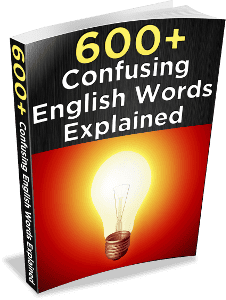
Difference between effective and efficient
If something is effective, it is good at achieving goals and accomplishing the desired result:
- an effective diet helps you lose weight successfully
- an effective medicine cures a disease or makes you get better
- an effective solution successfully resolves the problem
If something is efficient, it works in a way that does not waste resources.
- an efficient machine functions while using a minimum amount of energy
- an efficient process is one where there are no extra or unnecessary activities
- an efficient worker is someone who doesn’t waste time or effort
Let’s imagine a factory that is supposed to produce shoes. If the factory produces shoes, but the machines are old and waste energy, and there are too many employees who make mistakes and waste time, then the factory is effective (it accomplishes its goal of producing shoes) but not efficient.
If all the machines are new and streamlined, and there are few workers who are excellent at their jobs, but the factory produces hats instead of shoes… then the factory is efficient (because the process runs smoothly) but not effective (it does not produce the desired result).
Difference between suitable and appropriate
The word suitable describes when something is good to use for a specific purpose.
- A winter coat is suitable for keeping you warm; a light jacket is not suitable.
- A laptop case is suitable for protecting your computer from damage; a plastic bag is not suitable.
The word appropriate refers more to what is accepted culturally/socially.
- Nice clothes are appropriate for a job interview; a swimsuit is not appropriate.
- It is appropriate to kiss your husband/wife on the mouth; it is not appropriate to kiss someone you’ve just met on the mouth.
Difference between benefit and advantage
Both benefit and advantage refer to a good thing. Benefit be both a noun (a good thing) and a verb (get good things or be helped).
The only slight difference is that advantage is sometimes used in the sense of comparison with something else; being better than something else.
- Exercising regularly has many benefits.
- All the students will benefit from the new textbooks.
(here, “benefit” is being used as a verb, meaning the students’ experience will be better) - One advantage of studying online is that you don’t need to drive to school.
(comparing studying online to studying in a school) - Being tall is an advantage in basketball.
(you will have a better/easier experience compared to shorter players)
Difference between distinguish and differentiate
Both distinguish and differentiate have the same definition – to observe/understand the difference between things – so they can often be used interchangeably. A more common way to say it, in everyday English, is “tell the difference”, for example:
- I can’t distinguish/differentiate between Australian English and New Zealand English.
- I can’t tell the difference between Australian English and New Zealand English.
The word differentiate can have the additional meaning of “to make something different” – to cause the difference, not just to observe it. For example, let’s imagine you and your coworkers are designing a new company logo. Someone might say:
- Our company logo is too similar to our competitor’s logo; we need to differentiate it a little more.
= make it different, make it distinct
Also, if a person is described as distinguished (adjective) – that means he or she is famous, excellent, or has a great appearance/behavior. For example, a distinguished scientist or a distinguished actress. The word “differentiated” cannot be used in this way.

